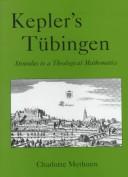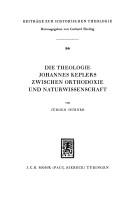| Listing 1 - 10 of 15 | << page >> |
Sort by
|

ISBN: 0749390778 0436032643 9780436032646 9780749390778 Year: 1993 Publisher: London : Minerva,
Abstract | Keywords | Export | Availability | Bookmark
 Loading...
Loading...Choose an application
- Reference Manager
- EndNote
- RefWorks (Direct export to RefWorks)
Johannes Kepler, born in 1571 in south Germany, was one of the world's greatest mathematicians and astronomers. The author of this book uses this history as a background to his novel, writing a work of historical fiction that is rooted in poverty, squalor and the tyrannical power of emperors.
Kepler, Johannes, --- Kepler, Jean --- Kepler, Johann --- Keppler, Giovanni
Book
ISBN: 3788100583 9783788100582 Year: 1971 Volume: 58/59 Publisher: Göttingen: Muster-Schmidt,
Abstract | Keywords | Export | Availability | Bookmark
 Loading...
Loading...Choose an application
- Reference Manager
- EndNote
- RefWorks (Direct export to RefWorks)
Kepler, Johannes, --- Keppler, Johann, --- Kepler, Jan, --- Kepler, Johann, --- Kepler, I. --- Kepler, Iogann, --- Kepler, John, --- Kepler, J. --- קפלר --- Kepler, Jean --- Kepler, Johann --- Keppler, Giovanni --- Kepler, Johannes
Book
ISSN: 18720684 ISBN: 9004246096 9789004246096 129969098X 9781299690981 9789004246089 9004246088 Year: 2013 Volume: v. 39 Publisher: Leiden ; Boston : Brill,
Abstract | Keywords | Export | Availability | Bookmark
 Loading...
Loading...Choose an application
- Reference Manager
- EndNote
- RefWorks (Direct export to RefWorks)
The cosmology of Johannes Kepler remains a mystery. On the one hand, Kepler’s speculations on spiritual faculties are seen as the remnants of Renaissance philosophy. On the other, his comparison of the cosmos to a clock summons the mechanical metaphor that shaped modern science. This book explores the inseparable connections between Kepler’s vitalistic views and his more enduring accomplishments in astronomy. The key argument is that Kepler’s ‘celestial biology’ served as a bridge between his revolutionary astronomy and other ‘less scientific’ interests, particularly astrology. Kepler's Cosmological Synthesis sheds new light on one of the foundational figures of the Scientific Revolution. By uncovering a new form of coherence in Kepler’s world picture, it traces the unlikely intersections of mechanism and vitalism that transformed the fabric of the heavens.
Cosmology --- Astronomy --- SCIENCE / Cosmology --- History. --- Kepler, Johannes, --- Kepler, Jean --- Kepler, Johann --- Keppler, Giovanni --- Philosophy.
Book
ISBN: 9780520254817 Year: 2011 Publisher: Berkeley University of California press
Abstract | Keywords | Export | Availability | Bookmark
 Loading...
Loading...Choose an application
- Reference Manager
- EndNote
- RefWorks (Direct export to RefWorks)
Astronomy, Renaissance --- Science --- History --- Philosophy --- Copernicus, Nicolaus, --- Galilei, Galileo, --- Kepler, Johannes, --- Natural science --- Science of science --- Sciences --- Renaissance astronomy --- Copernicus, Nicolaus --- Galilei, Galileo --- Kepler, Johannes --- Kepler, Jean --- Kepler, Johann --- Keppler, Giovanni --- Galileo Galilei --- Galilée --- Copernic, Nicolas --- Kopernik, Mikołaj --- Natural sciences
Book
ISBN: 9780226496979 022649697X Year: 2017 Publisher: Chicago (Ill.) : University of Chicago press,
Abstract | Keywords | Export | Availability | Bookmark
 Loading...
Loading...Choose an application
- Reference Manager
- EndNote
- RefWorks (Direct export to RefWorks)
A committed Lutheran excommunicated from his own church, a friend to Catholics and Calvinists alike, a layman who called himself a "priest of God," a Copernican in a world where Ptolemy still reigned, a man who argued at the same time for the superiority of one truth and the need for many truths to coexist--German astronomer Johannes Kepler was, to say the least, a complicated figure. With The Pursuit of Harmony, Aviva Rothman offers a new view of him and his achievements, one that presents them as a story of Kepler's attempts to bring different, even opposing ideas and circumstances into harmony. Harmony, Rothman shows, was both the intellectual bedrock for and the primary goal of Kepler's disparate endeavors. But it was also an elusive goal amid the deteriorating conditions of his world, as the political order crumbled and religious war raged. In the face of that devastation, Kepler's hopes for his theories changed : whereas he had originally looked for a unifying approach to truth, he began instead to emphasize harmony as the peaceful coexistence of different views, one that could be fueled by the fundamentally nonpartisan discipline of mathematics.
Cosmology. --- Harmony (Aesthetics). --- Religion and science. --- Kepler, Johannes, --- Harmony (Aesthetics) --- Religion and science --- Cosmology --- Aesthetics --- Astronomy --- Deism --- Metaphysics --- Christianity and science --- Geology --- Geology and religion --- Science --- Science and religion --- Religious aspects --- Kepler, Jean --- Kepler, Johann --- Keppler, Giovanni
Book
ISBN: 0416769802 2705656480 0801405041 Year: 1973 Publisher: London Methuen
Abstract | Keywords | Export | Availability | Bookmark
 Loading...
Loading...Choose an application
- Reference Manager
- EndNote
- RefWorks (Direct export to RefWorks)
Borelli, G. --- Kepler, Johannes --- Copernicus, Nicolaus --- Borelli, Giovanni Alfonso --- Ko-pai-ni, Ni-ku-la, --- Kopernik, Mikołaj, --- Kopernik, Nikolaĭ, --- Kopernikus, Nikolaus, --- Coppernicus, Nicolaus, --- Copérnico, Nicolás, --- Koppernigk, Niklas, --- Copernicus, Nicholas, --- Copernic, Nicolas, --- Copernico, Niccolò, --- קופרניקוס, ניקולאוס, --- קופרניקוס, ניקולי, --- Kepler, Jean --- Kepler, Johann --- Keppler, Giovanni --- Copernic, Nicolas --- Kopernik, Mikołaj --- Borelli, Giovanni Alfonso, --- Copernicus, Nicolaus, --- Kepler, Johannes,

ISBN: 1859283977 Year: 1998 Volume: *63 Publisher: Aldershot [etc.] Ashgate
Abstract | Keywords | Export | Availability | Bookmark
 Loading...
Loading...Choose an application
- Reference Manager
- EndNote
- RefWorks (Direct export to RefWorks)
Astronomers --- Religion and science --- Science --- Natural science --- Science of science --- Sciences --- Christianity and science --- Geology --- Geology and religion --- Science and religion --- Biography --- History --- Religious aspects --- Kepler, Johannes --- Kepler, Jean --- Kepler, Johann --- Keppler, Giovanni --- Tübingen (Germany) --- Intellectual life --- Natural sciences --- Kepler, Johannes, --- Tübingen (Germany)
Book
ISBN: 9782251420363 2251420363 Year: 2008 Volume: 29 Publisher: Paris: Les Belles Lettres,
Abstract | Keywords | Export | Availability | Bookmark
 Loading...
Loading...Choose an application
- Reference Manager
- EndNote
- RefWorks (Direct export to RefWorks)
Nous sommes dans les dernières années du seizième siècle ; une nouvelle époque, plus dure, s'ouvre pour la culture européenne. Une infime minorité de philosophes et de mathématiciens a entrepris de jeter les fondements d'une nouvelle constitution de l'univers. La genèse de cette recherche et ses premiers progrès sont reconstruits dans ce livre à travers l'histoire intellectuelle et humaine de deux personnages majeurs de la modernité : Galilée (1564-1642) et Kepler (1571-1630). Les deux savants ne sont pas simplement présentés dans leurs rôles de " pionnier " et de " vainqueur ". Ce livre nous les montre aussi en train d'élaborer une nouvelle physique et une nouvelle astronomie. On les voit aux prises avec les observations célestes mais aussi avec d'épineuses questions religieuses et politiques qui étaient indissociables de leurs projets et de leurs stratégies intellectuelles. Dans les mondes séparés et ennemis où il leur fallait bien vivre, Kepler et Galilée ont subi les injures des hommes de leur temps : Kepler a été excommunié par l'Église luthérienne pour ses idées calvinistes sur l'Eucharistie, Galilée a été condamné à la prison à vie par l'Eglise de Rome pour sa scandaleuse défense de l'héliocentrisme. L'ouvrage propose enfin un voyage passionnant dans l'Europe de la révolution scientifique.
Philosophy and science --- Religion and science --- Philosophie et sciences --- Religion et sciences --- History --- Histoire --- Kepler, Johannes, --- Galilei, Galileo, --- Criticism and interpretation. --- Christianisme et sciences --- Astronomie --- Galilei, Galileo --- Kepler, Johannes --- Critique et interprétation --- Astronomie. --- Histoire. --- Philosophie. --- Religion. --- Galilée --- Kepler, Johann, --- Kepler, Johannes. --- Critique et interprétation. --- 17e siècle.
Book
ISBN: 3050000651 9783050000657 Year: 1986 Volume: 126/6 Publisher: Berlin: Akademie,
Abstract | Keywords | Export | Availability | Bookmark
 Loading...
Loading...Choose an application
- Reference Manager
- EndNote
- RefWorks (Direct export to RefWorks)
Kepler, Johannes --- Müller, Philipp --- Astronomy --- History --- Kepler, Johannes, --- Müller, Philipp, --- Müller, Philipp, --- Kepler, Jean --- Kepler, Johann --- Keppler, Giovanni --- Astronomy - History --- Kepler, Johannes, - 1571-1630 --- Müller, Philipp, - 1585-1659 --- Astronomie --- Kepler (johannes), astronome allemand, 1571-1630 --- Histoire --- Critique et interpretation

ISBN: 3161360427 9783161360428 Year: 1975 Volume: 50 Publisher: Tübingen: Mohr,
Abstract | Keywords | Export | Availability | Bookmark
 Loading...
Loading...Choose an application
- Reference Manager
- EndNote
- RefWorks (Direct export to RefWorks)
Religion and science --- History --- Kepler, Johannes, --- 215 --- -Christianity and science --- Geology --- Geology and religion --- Science --- Science and religion --- Godsdienst en wetenschap --- Religious aspects --- Kepler, Johannes --- -Godsdienst en wetenschap --- Kepler, Jean --- Kepler, Johann --- Keppler, Giovanni --- History of controversy --- Religion and science - History --- Kepler, Johannes, - 1571-1630
| Listing 1 - 10 of 15 | << page >> |
Sort by
|

 Search
Search Feedback
Feedback About UniCat
About UniCat  Help
Help News
News